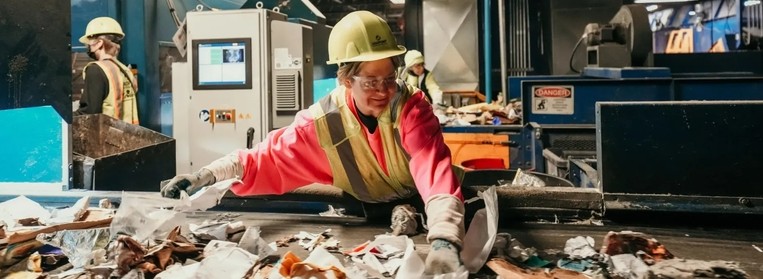Global recycling stalls as production soars, new study states
main text
Global recycling stalls as production soars, new study states

Recycle Minnesota
A worker sorts materials at a Minnesota recycling center.
A new study out of China backs what many have already said: global plastic recycling is stagnant in the face of rapidly growing production.
Researchers at Tsinghua University peg the global plastic recycling rate at 9 percent while there is what they describe as a significant shift in plastic waste disposal.
"Incineration is emerging as a prominent waste disposal method (34 percent)," researchers said, while "landfill is decreasing substantially (40 percent)."
The report in the Communications Earth & Environment journal, uses 2022 statistics, and also includes details on overall plastics production. It has the very journal-esque title of "Complexities of the global plastics supply chain revealed in a trade-linked material flow analysis."
"The global demand for plastics has quadrupled over the past decades and it is projected to double by 2050," the report states.
The report puts global plastic production at 400 million metric tons and indicates 362 million metric tons is virgin resin with the other 38 metric tons coming from mechanical recycling. A metric ton, weighing about 2,200 pounds, is 10 percent heavier than a U.S. ton, also known as a short ton weighing 2,000 pounds.
An overwhelming amount of virgin plastic comes from fossil-fuel based feedstocks — 98 percent — with the remaining 2 percent emerging from bio-based sources.
The report also states that 13.42 million metric tons of virgin plastics is lost during production, resulting in 348.52 million metric tons of virgin plastics being processed. Add that to the recycled number, and the total processed during 2022 was 386.41 million metric tons.
Packaging accounted for the largest portion of plastics use in 2022 at 158 million metric tons with building and construction coming in second at 72 million metric tons, the report states. Automotive applications were third at 32 million metric tons followed by both the electrical and electronics and the household and textiles categories each representing 28 million metric tons of use. Agriculture was at 16 million metric tons and other uses accounted for 48 million metric tons in that year, the report states.
Of the total amount of plastics created in 2022, 267.8 million metric tons became waste, including 74.75 million tonnes that were sorted and collected for mechanical recycling. Another 6.66 million tonnes were traded.
Of the total heading for mechanical recycling, the analysis indicates 37.96 million metric tons were recycled. This represents the 9 percent recycling rate of overall plastics production, the report states. The remaining material was incinerated or landfilled.
China was listed at the largest producer in 2022 with 32 percent of production, followed by other countries in Asia at 15 percent and the United States at 14 percent. The European Union made 14 percent as well while the Middle East and India were each at 5 percent, followed by Africa at 4 percent, Japan at 3 percent. The rest of the world accounted for 8 percent of production, the study shows.
"Several challenges contribute to the limited progress in enhancing global recycling practices. One major issue is the vast diversity and complexity of plastic materials, which include various types, grades, and additives," the report states. "This complexity limits the efficient sorting and processing of plastic waste.
"Contamination of plastic waste with food residues, labels, and other impurities further undermines recycling efforts, as these contaminants can degrade the quality of recycled materials and create operational challenges in recycling facilities," the study continues.
"Economic factors also play a crucial role; the market conditions surrounding the cost of virgin plastic are often more favorable than those for recycled plastic, primarily due to fluctuating oil prices. This economic barrier discourages investment in recycling infrastructure and technology, perpetuating the cycle of low recycling rates," according to the report.
* Edit : HANDLER
